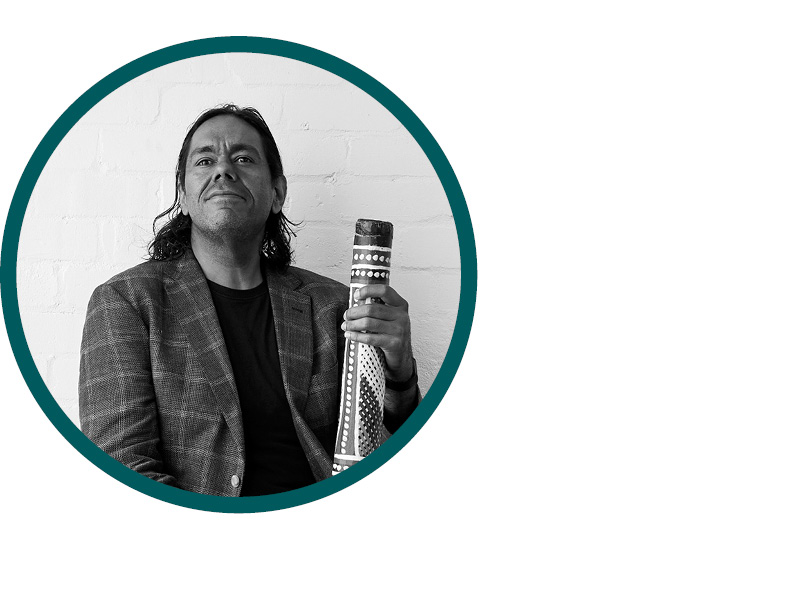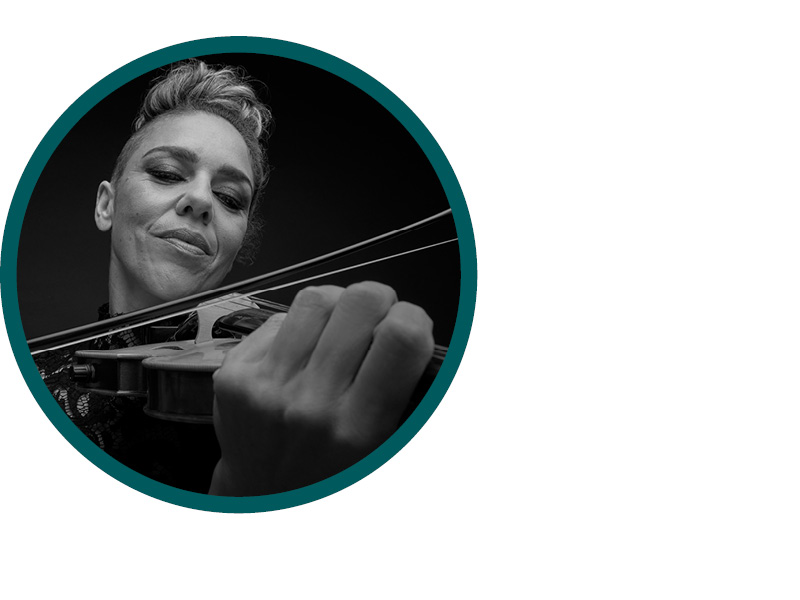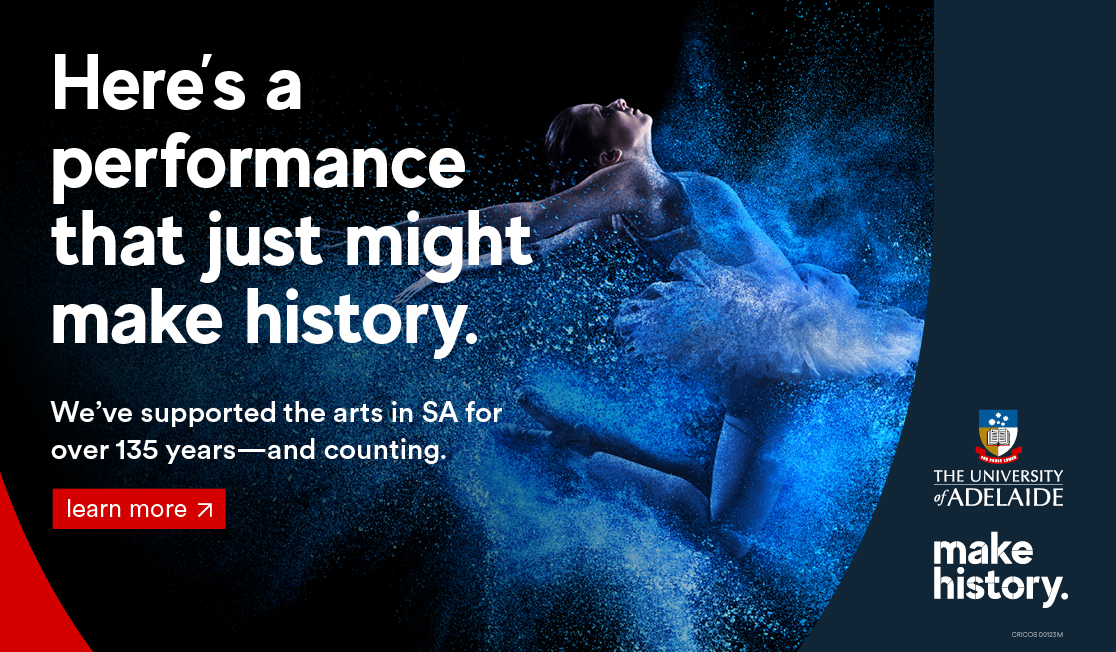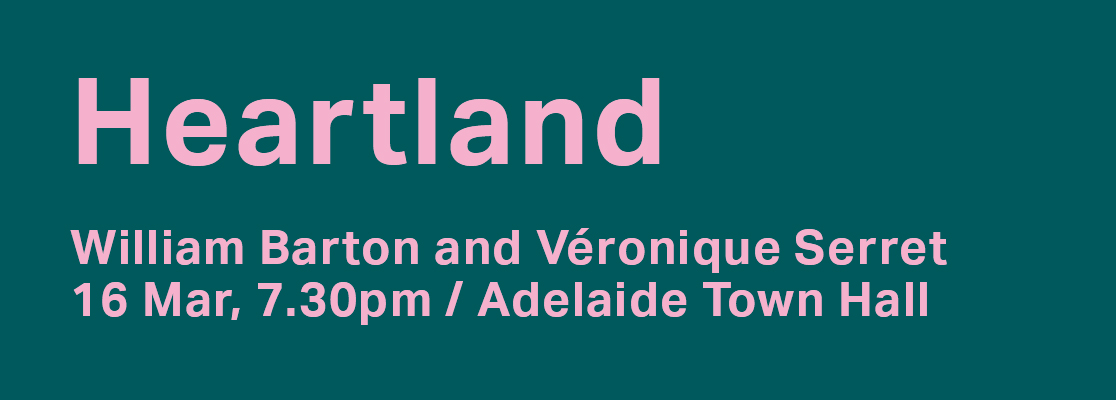Your Digital Program
Info
Credits
Didgeridoo, guitar and voice William Barton
Violin and voice Véronique Serret
Moving projections Samuel James
Image WILK
Program
William Barton & Véronique Serret
Heartland
Bush Mujik
Dreamtime Dawning #1
Petrichor
Kalkani
Dreamtime Dawning #2
Runs Deep / Dreamtime Dawning #3
Heartland
Didge Fusion
Dreamtime Dawning #4
The Heartland album is available for purchase through ABC Classic.
About the Show
The great didgeridoo virtuoso William Barton and powerhouse violinist Véronique Serret blend songlines and storytelling in this compelling collaborative work. Inspired by the poetry of William’s mother, Aunty Delmae Barton, the message of Heartland is of peace and love carried by an eagle spirit.
Barton and Serret welcome listeners into a unique soundscape, drawing on the power of connection to place. Violins, didgeridoo and guitar are joined by soaring vocals, ethereal loops and electronic effects in a distinct evocation of the Australian landscape.
From its roots as a seven-minute commission for the 2019 Canberra International Music Festival, this extraordinary work has grown into an hour-long reimagined “chamber oratorio” exploration of Country, landscape, culture, language and identity. The program features the duo’s much-loved Kalkani (commissioned by the ABC), Didge Fusion and Heartland itself. It comes to the Adelaide Festival on the back of sell-out seasons in Sydney, Canberra, Darwin and Brisbane.
Let Heartland’s fusion of traditional songlines and contemporary storytelling take you on a meditative and uplifting musical journey.

William Barton
Composer, producer, multi-instrumentalist and vocalist, William Barton is widely recognised as one of Australia's leading didgeridoo players and composers.
For two decades, William has forged a peerless profile as a performer and composer in the classical musical world, from the Philharmonic Orchestras of London and Berlin to historic events at Westminster Abbey for Commonwealth Day 2019, Anzac Cove and the Beijing Olympics. His awards include Winner of Best Original Score for a Mainstage Production at the 2018 Sydney Theatre Awards and Winner of Best Classical Album with ARIA for Birdsong At Dusk in 2012. With his prodigious musicality and the quiet conviction of his Kalkadunga heritage, he has vastly expanded the horizons of the didgeridoo — and the culture and landscape that it represents.
“I grew up on a cattle station just outside Mount Isa in northwest Queensland. I started learning the didgeridoo from about the age of seven from my uncle, Arthur Peterson. He was an elder of the Wannyi, Lardil and Kalkadunga people.”
His mother — singer, songwriter and poet Delmae Barton — remembers him dancing to Elvis Presley when he could barely stand. He recalls Beethoven and Vivaldi streaming from ABC classic FM radio, and AC/DC in his cassette player. Through it all, the hypnotic whoop and drone of the didgeridoo wove a common thread in his imagination.
By the age of 12, William was sure enough of his destiny to leave school to concentrate on music.
“What I remember so clearly from my uncle is him telling me that the didgeridoo is a language. It’s a speaking language and like any language, it’s something that you’ve got to learn over many months, and many years. It’s got to be a part of you, and what you do.”
After his uncle passed, he says: “I was given the special privilege by his family of holding onto his didgeridoo, which is quite a rare honour in Aboriginal culture because when an old song man passes away, they usually break his didgeridoo into pieces or even throw it out into the fire just to silence the sound forever of that old song man.”
At 17, William realised a lifelong dream when he was invited to perform with the Queensland Symphony Orchestra. But the full, rapturous embrace of the classical music world came in 2004, when Tasmanian composer Peter Sculthorpe unveiled his Requiem with the Adelaide Symphony Orchestra and guest soloist, William Barton. That night, William was invited to join the orchestra in Japan, to perform Sculthorpe compositions Earth Cry and Mangrove. Tours to the USA and New Zealand followed, and the composer and didgeridoo artist cemented a firm creative partnership. "William offered me a new direction," the late composer has said, praising his instinctive musicality and skill as an improviser. “He’s almost like a magician… bringing my music home.”
By the mid 2010s, despite a bare minimum of formal musical education, William had won an ARIA Award for his classical album Kalkadungu, composed a world premiere work for members of the Berlin Philharmonic at Sydney Opera House, and unveiled his first string quartet, Birdsong at Dusk, with the Kurilpa String Quartet and Delmae on vocals. In a recent prestigious event that was broadcast live on BBC One, he premiered his composition “Kalkadungu’s Journey” at Westminster Abbey for Her Majesty The Queen, Head of the Commonwealth, and the Royal Family, at the Commonwealth Service to commemorate Commonwealth Day 2019.
Today he holds honorary doctorate degrees from the Universities of Griffith and Sydney, has had released five albums on the ABC Classics label and is an Artist in Residence at Melbourne Recital Centre. His album Kalkadungu: music for didjeridu and orchestra features predominantly his own compositions, alongside those of Delmae and Peter Sculthorpe.
“I’m doing what I love. I want to take the oldest culture in the world and blend it with Europe’s rich musical legacy. I guess what I’m doing is giving back: giving back to my culture and my people because I was given something when I was very young and like the old fellas who taught me years ago, I’m just passing it on.”
Visit his website here.

Véronique Serret
One of Australias most versatile musicians, Véronique is equally at home on the concert hall platform and the rock n roll stage. The ‘Girl from Guildford’ carving a niche for herself directing string sections for rock bands, indie artists, feature films and studio sessions.
A soloist and collaborative artist, Véronique has deep gratitude for her early rigorous classical training and her many teachers and mentors along the way. Over many decades, she has been fortunate to work extensively with Bangarra Dance Theatre, Australian Chamber Orchestra, Sydney Dance Company and as concertmaster of the Darwin Symphony. She has directed live string sections for the likes of Gurrumul, Jonsi, Fleet Foxes, Neil Finn, Sarah Blasko, Amanda Palmer, Cinematic Orchestra, Neil Gaiman, Damon Albarn, Kate Miller Heidke, Ed Kuepper, Martha Marlow, Mike Patton and Tim Minchin.
She has played in bands with Indigenous songman Archie Roach, been in residence with Laurie Anderson, performed at major festivals including Barunga, Garma, MoFo, WoMad and Woodford and has appeared as soloist with the Sydney Symphony Orchestra performing Arvo Part’s Tabula Rasa at the Sydney Opera House and toured Europe and South America with Sydney Dance Company performing Bach’s Partita No.2 in D minor to critical acclaim. This was also her debut album release.
A regular in the recording studio, Véronique regularly collaborates with Australia’s film composers and can be heard on countless Australian soundtracks and albums.
In the late 1990s, Véronique co-founded the band CODA and since 2010 she has been a member of Joanna Newsom’s international touring band as a multi-instrumentalist and backing vocalist.
Véronique is now dedicated to the creation of new music and the exploration of sound through diverse collaborations. She is a member of art music group Ensemble Offspring and has her own duo project with didgeridoo legend William Barton. Together their recent compositions include Bushfire Requiem (2020) commissioned by Artology for Sydney Festival, Songlines of our Universe (2021) written whilst in residence at the Sydney Observatory, Heartland (2019) commissioned by Canberra International Festival of Music and Kalkani (2020) commissioned by the ABC. This work features in a beautiful award winning dance film, Urritjara, by Tim Georgeson.
Véronique's own music blends loops, delays, reverbs and vocals redefining the expression of the violin. Utilising both her acoustic and 6 string electric violins, various percussive elements and field recordings, she orchestrates her ever-shifting landscape. Véronique merges sounds of old and new to create her flow, a nod to the past, yet firmly planted in the present day.
Véronique’s own language activated by the raw sounds of the Australian bush, the island vibes of her native Mauritius sprinkled with scenes from a life on the road, her love of solo trekking and deep listening. All unite to generate a contemporary, sonic force field.
In 2020, Véronique was fortunate to spend time in residence at the Peggy Glanville Hicks house in Sydney’s Paddington where she developed her own unique compositional voice. She was awarded a Career Development Grant (2019) by the Australia Council for the Arts enabling her to continue exploring this path of creativity and quiet activism through music.
Véronique is passionate about inclusivity, the environment, and ashtanga yoga.
She plays a 1900 Leandro Bisiach violin and a 6 string custom violin by Paul Davies.
Visit her website here.






Festival for the Future
Adelaide Festival is proudly Carbon Neutral and you can help us reduce our impact on the environment further! This year, Adelaide Festival has partnered with Reforest and Trees for Life to support the Mannavale farm bushfire recovery project in Adelaide Hills.
Plant one for the planet as part of your Adelaide Festival experience. You can learn more about the project, take action and track your impact here.
Your contribution through Reforest will help repair the damage caused by both bushfires and historical land clearing, and help Trees for Life plant a range of native species to restore an area of forest habitat for native wildlife.



